The Kroger Company is one retail company that has its supply chain processes and management in order and delivers outstanding performance results. Despite Kroger supply chain issues, the company still manages to be one of the largest supermarket operators by revenue in the United States and the fourth-largest general retailer as of 2022.
This American retail company was founded by Bernard Kroger in 1883 in Cincinnati, Ohio, and operates supermarkets and multi-department stores directly or through its subsidiaries.
We will be discussing Kroger supply chain issues and how the company manages its operations to stay ahead of its competitors.
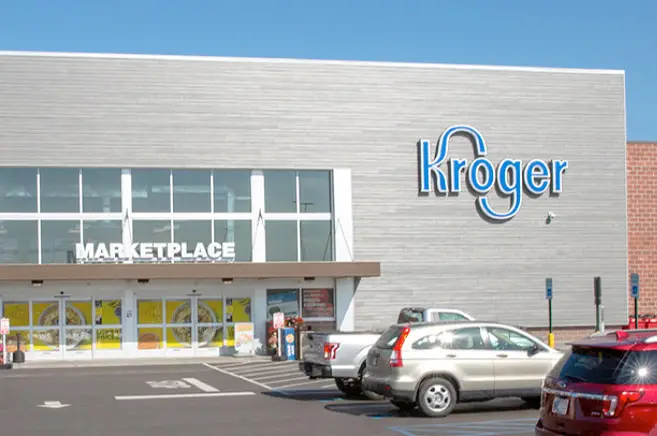
See also: IKEA Supply Chain Problems and Issues
Kroger supply chain management and process
- Procurement
- Manufacturing
- Distribution and logistics
- Warehousing
- Private label brands
- Kroger retail stores
Kroger’s supply chain process and its effective management are what give the company a higher market share in the retail industry. In this section, we will discuss the various processes involved in Kroger’s supply chain and its management.
Procurement and manufacturing
The Kroger supply chain offers products across various categories, such as meat, grocery, deli, dairy, personal care, coffee, bakery, and household essentials. Some of its products are manufactured by the company itself while some are procured from external suppliers.
The company operates 38 manufacturing plants (either wholly owned or used with operating agreements) that are responsible for approximately 40 percent of the company’s private brands, while the remaining 60 percent of its private brands (most non-food private brands) are supplied by third-party manufacturers/suppliers.
Kroger being able to manufacture some of its own private brands gives the company incredible sourcing power and better leverage. Therefore, giving the company a competitive advantage. By producing its own products, costs are lowered and the company passes the savings on to its customers. This allows Kroger to be able to monitor its costs effectively and deliver high-quality products at a competitive price.
Kroger’s manufacturing plants
Most of Kroger’s brand products are supplied by third-party manufacturers while the rest of its products are made in-house at its 38 manufacturing plants.
The company owns about nineteen plants that produce its dairy products, ten plants for bakery products (including two that also manufacture deli products), and the remaining seven plants that produce grocery items. These plants are strategically spread across the country and are located near the company’s divisions.
Kroger dairy plants
- Crossroad Farms Dairy in Indianapolis, Indiana
- Centennial Farms Dairy in Atlanta, Georgia
- Compton Creamery in Compton, California
- Vandervoort’s Dairy in Fort Worth, Texas
- Michigan Dairy in Livonia, Michigan
- Jackson Hutchinson Dairy in Hutchinson, Kansas
- Riverside Creamery in Riverside, California
- Layton Dairy in Layton, Utah
- Tolleson Dairy in Tolleson, Arizona
- Pace Dairy in Rochester, Minnesota
- Swan Island Dairy in Portland, Oregon
- Pace Dairy in Crawfordsville, Indiana
- Mountain View Foods in Denver, Colorado
- Tamarack Farms Dairy in Newark, Ohio
- Winchester Farms Dairy in Winchester, Kentucky
- Hunter Farms Dairy in High Point, North Carolina
- Heritage Farms Dairy in Murfreesboro, Tennessee
- Westover Dairy in Lynchburg, Virginia
All these dairy plants are 100 percent vertically integrated; that is, they are all owned and controlled by Kroger. The advantage of such a vertical integration strategy is that it allows the company to be effective and faster in producing and distributing its dairy produce. This helps to avoid any Kroger supply chain issues that may affect the supply of dairy products in the company’s retail stores.
Kroger Bakeries
- Indianapolis Bakery in Indianapolis, Indiana
- K.B. Specialty Foods in Greensburg, Indiana
- King Soopers Bakery in Denver, Colorado
- La Habra Bakery in La Habra, California
- Anderson Bakery in Anderson, South Carolina
- Layton Dough in Layton, Utah
- Country Oven Bakery in Bowling Green, Kentucky
- Clackamas Bakery in Clackamas, Oregon
- RCK Foods in Kenosha, Wisconsin
Kroger-owned grocery plants
- Kenlake Foods in Murray, Kentucky produces Kroger’s store-label nuts, hot cereal, cornmeal, and powdered drinks.
- America’s Beverage Co. in Irving, Texas makes Kroger-brand soft drinks and bottled water.
- Tara Foods in Albany, Georgia produces Kroger’s store-label peanut oil, peanut butter, flavoring extracts, steak sauces, vinegar, cooking wines, lemon juice, soy sauce, and liquid water enhancers.
- Delight Products in Springfield, Tennessee makes Kroger’s dry dog and cat foods
- Pontiac Foods in Pontiac, South Carolina makes Kroger’s rice, coffee, seasonings, spices, noodles, and sauces
- Springdale Ice Cream & Beverage in Springdale, Ohio manufactures Kroger’s ice cream and carbonated beverages
- State Avenue in Cincinnati, Ohio makes red sauces, broths, salad dressings, jams, syrups, and jellies
Kroger Suppliers
About 60 percent of Kroger’s brand products, especially its non-food private brands are supplied by third-party manufacturers. The company works with third-party manufacturers of all sizes and varying geographies.
As part of Kroger’s supply chain management approach, the company studies the players in a particular product landscape when determining potential suppliers. This is done to decide if the company will need one or multiple partners, and if the potential supplier can effectively deliver to Kroger’s distribution centers.
In order for a company to become a supplier to Kroger, it must be certified by a third-party agency and must meet Kroger’s selection criteria and requirements. Therefore, the contract terms of Kroger suppliers vary by commodity and service and the suppliers go through a rigorous vetting process, especially for food safety and quality.
In order to ensure a seamless Kroger supply chain process, the grocery chain has a system in place that alerts the Supplier Diversity team when contracts expire so that a list of potential suppliers can be submitted to review for the upcoming bid.
List of Kroger suppliers
- Niagara Bottling in Ontario supplies Kroger with bottled water
- Ralston Foods manufactures Kroger brand cereal
- Clearwater Paper manufactures Kroger paper towels
- Kraft Foods makes Kroger brand cheese
- VitaCost manufactures Kroger brand vitamins
- Perrigo Nutritionals makes Kroger store label baby food
Distribution and logistics
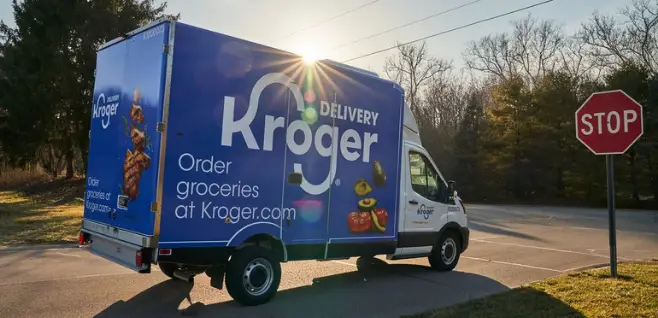
Distribution and logistics are essential parts of a company’s supply chain process. This is a part of Kroger’s supply chain management that deals with the efficient transportation and flow of goods from the point of production to the point of consumption.
Logistics management holds Kroger’s supply chain process together. The company contracts with various trucking companies and operates its own fleet of trucks and trailers to ensure seamless distribution of its products to its various stores.
As part of Kroger’s supply chain management process, the company uses data science and collaborates with partners in order to maintain the integrity of its supply chain and minimize dwell time in its distribution network.
Also, in order to manage its logistics and distribution process effectively, Kroger reduces fuel cost headwinds through technology and process efficiencies by implementing certain partnerships and innovations such as:
- Grocery delivery through autonomous vehicles (Kroger and Nuro partnership)
- Grocery delivery through autonomous drones (Kroger and Drone Express partnership)
Grocery delivery through autonomous vehicles
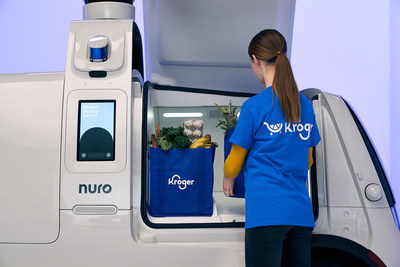
In 2018, Kroger announced a partnership with Nuro, a leading autonomous vehicle company. This partnership was implemented to deliver fresh groceries using all-electric, autonomous vehicles. This leading-edge e-commerce solution helps to offer customer-focused convenience to Kroger’s customers regardless of the amount of groceries.
This enterprising grocery delivery service helps to solve one of Kroger’s supply chain issues, which is the challenge of meeting customers’ changing demands. Integrating this delivery option into Kroger’s supply chain favors customers that are evolving and keen on reducing their climate impacts. It also supports Kroger’s commitment to reduce its corporate greenhouse gas emissions.
Grocery delivery through autonomous drones
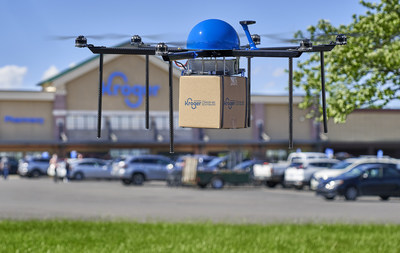
In 2021, Kroger introduced the drone delivery pilot in partnership with Drone Express, a division of TELEGRID Technologies, LLC. This grocery delivery through autonomous drones offers customers unparalleled flexibility. It allows package delivery to the location of a customer’s smartphone, thus, providing customers with anything, anytime, anywhere within as little as 15 minutes.
Integrating autonomous drones in the Kroger supply chain process provides safe, secure, and environmentally friendly deliveries for Kroger customers. This is a cost-effective, and efficient last-mile solution that offers flexibility and immediacy to customers.
Warehousing and inventory management
As part of Kroger supply chain management approach, the company has a large distribution network, with over 30 warehouses in different states including Texas, Ohio, California, etc.
Kroger supply chain also uses a wide array of tech solutions to address the challenging task of inventory management. In order to streamline operations, Kroger has done the following in recent years:
- Launched partnerships with vendors across a variety of developing technologies (such as vertical farming and smart carts)
- Invested in Nuro (an autonomous last-mile delivery company)
- Built automated micro-fulfillment centers (CFC) through its strategic partnership with UK-based Ocado.
Customer Fulfillment Centers (CFC)
Kroger operates automated warehouses (customer fulfillment centers) across the country in partnership with Ocado Group. These CFC facilities use proprietary technology solutions that are focused on advanced robotics and automation artificial intelligence (AI). They enable more customers to have access to more products faster and streamline deliveries of online grocery orders to customers.
The company also uses Ocado’s in-store fulfillment (ISF) capabilities, which include proprietary software that makes it easier and more efficient to find products when fulfilling pickup orders, thus, supporting employees’ efforts to assemble orders.
Integrating CFC facilities into Kroger’s supply chain helps to create more seamless and efficient customer fulfillment, picking, and delivery capabilities. This gives the grocery chain a competitive advantage over competitors because it enables Kroger to scale faster.
That is, by investing in CFCs, the company is able to serve a vast population using one single building, compared to its competitors that invest in hundreds of facilities to serve the same amount of population.
Private label brands
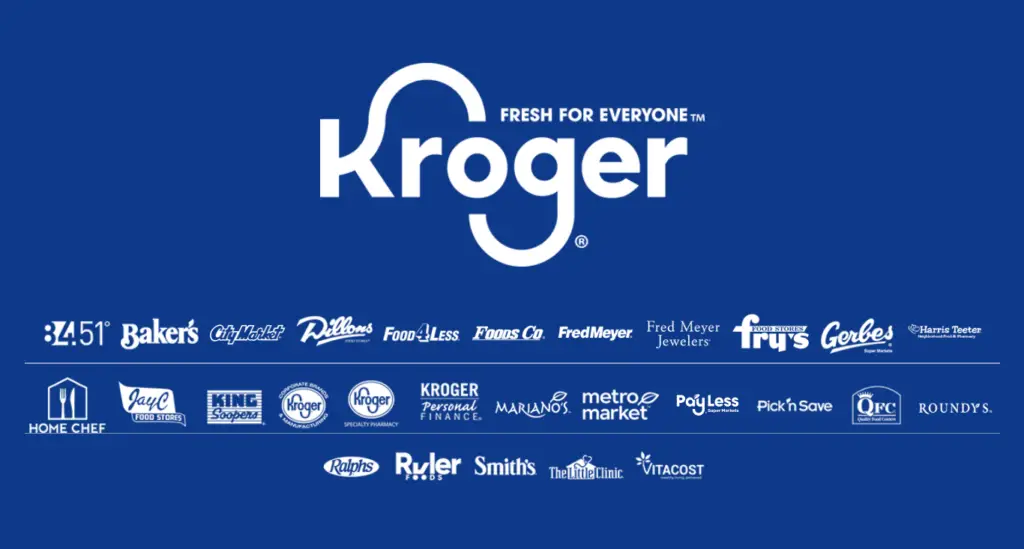
Kroger offers customers a collection of its own branded products, which it calls “Our Brands”. The company’s Our Brands private label portfolio includes:
- Banner Brand
- Private Selection
- Kroger’s Simple Truth
- Other private labels like Home Chef, Heritage Farm, Everyday Living, etc
Banner Brand
Banner Brand includes all items that bear the name of Kroger or its subsidiaries and are exclusively offered within Kroger-owned stores such as Ralphs, King Soopers, Big K, etc. These items account for over $13 billion in annual sales and are marketed to customers as budget-friendly.
Private Selection
Kroger supply chain offers products that are marked Private Selection. These are products that are offered by the company to compare with those regional brands or gourmet brands that are relatively more expensive (produced to appeal to affluent consumers) than the standard Kroger brand products.
Kroger’s Private Selection offers unique products such as:
- Private Selection™ Petite Gold Gourmet Potatoes
- Private Selection™ Petite Red Gourmet Potatoes
- Private Selection™ Petite Medley Gourmet Potatoes
- Private Selection™ Petite Fingerling Gourmet Potatoes
- Private Selection™ Smoked Gouda Onion & Thyme Seasoned Petite Potatoes
Kroger’s Simple Truth
Simple Truth was launched in 2012; the first time the company had delved into making its own gluten-free products. This flagship natural and organic brand has grown since its launch and reached $2 billion in annual sales in 2018. It offers organic and natural products such as:
- Simple Truth™ Natural Cage Free Large Brown Eggs
- Simple Truth Organic™ Baby Spinach
- Simple Truth™ Natural Raised Cage Free Boneless & Skinless Chicken Breast
- Simple Truth Organic® Baby Spring Mix
- Simple Truth™ Natural 93% Lean Ground Turkey
Other Private-label brands
Apart from its core brands, Kroger supply chain manufacture and creates a variety of department-specific brands. Such featured goods may be found in Fred Meyer stores or various Kroger-owned stores. These brands include:
- Bakery Fresh Goodness which offers fresh-baked foods
- Abound which offers natural pet food
- Bloom Haus Brand which offers floral arrangements
- Comforts Brand which offers baby products
- Everyday Living which offers home goods
- HD Designs which offers upscale home goods
- OfficeWorks which offers stationery and office supplies
Kroger retail stores
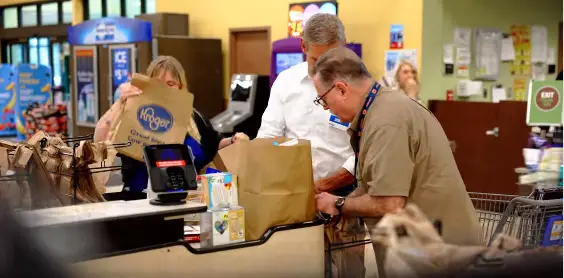
Kroger uses sophisticated consumer insights to meet the desires of its customers. Hence, the items sold in its retail stores are dictated by the needs of its customers.
Nonetheless, as part of Kroger supply chain management approach, the company operates its grocery retail stores under the following format:
- Supermarkets
- Multi-department stores
- Kroger Marketplace
- Price-impact warehouse stores
Supermarkets
The primary supermarket format of Kroger is a combination of food and drug store. These stores are large and offer high-margin specialty departments such as world-class perishables, whole health sections, pharmacies, and pet centers.
Typical examples of Kroger retail stores that operate in this format include Kroger, Metro Market, Dillons, Mariano’s, Ralphs, King Soopers, Owen’s, Smith’s, and Fry’s. Others include QFC, Baker’s, City Market, Pay Less, Gerbes, Harris Teeter, Pick ‘n Save, etc.
Multi-department stores
Kroger supply chain operates multi-department stores which average over 165,000 square feet and carries more than 225,000 apparel, food, and general merchandise products in one building. Fred Meyer is a typical example of a Kroger retail store that operates in this format.
This kind of retail store includes a broad selection, such as:
- Full-line supermarket
- Apparel
- Home Fashion
- Shoes
- Accessories
- Garden
- Home Electronics
- Paint and hardware
- Nutrition centers
Kroger Marketplace
Kroger Marketplace is a multi-department store that ranges in size from 100,000 to 130,000 square feet. It offers general merchandise, as well as full-service grocery and pharmacy.
Typical examples of retail stores in Kroger supply chain that operates in the marketplace format include Kroger Marketplace, Fry’s Marketplace, Dillons Marketplace, King Soopers Marketplace, Smith’s Marketplace, etc.
Price-impact warehouse stores
As part of kroger supply chain, the company operates price-impact warehouse stores that average more than 57,000 square feet in size. These stores offer distinctive ethnic products, meat, dairy products, baked goods, fresh produce, health and beauty care items, and a wide selection of national brand groceries.
Food 4 Less, and Foods Co are typical examples of such stores. These stores offer high-quality produce and operate in the warehouse format. They cater to the demographics of the neighborhoods that they serve by offering everyday low prices to budget-conscious shoppers.
Check out: Nestlé Supply Chain Issues and Management
Kroger supply chain issues
- Inflation
- Labor challenges
- Supply chain disruptions due to Covid
- Evolving customer demands
- Economic challenges
- Retaining customers
Inflation
Inflation is one of Kroger supply chain issues. With the rate of inflation hitting unprecedented levels, many retailers are steadily looking for new ways to balance costs, without driving away customers. This is one of the problems Kroger is facing because the company has to choose between passing on the price increase directly to its customers or saving costs in other ways.
Inflation significantly has an impact on consumer spending habits and this can affect sales for retail businesses. Due to inflationary pressure, many consumers try to cut down on their spending and go as far as looking for sales or shopping at discount retailers.
According to Rodney McMullen, Kroger CEO, customers are rethinking their shopping and eating habits due to rising inflation. He said on a call with analysts that the company is seeing different shopping behaviors based on how customers are experiencing the current inflationary environment.
In 2021, he mentioned that about 82% of Kroger consumers said they are feeling the impact of inflation, and about one in four consumers said they were not confident in their finances at the moment. As a result of this feedback, the company is leveraging its data and personalization to enable its customers to stretch their food dollars.
Kroger’s strategy to tackle the issue of inflation has been to deliver value to customers through personalized promotions, big packs, and dynamic holiday offerings. Also, due to the wide variety of high-quality and innovative products that Kroger has at various price points, the company has been able to offer its customers flexibility in their spending without compromising on quality.
Labor challenges
One of the major issues that the retail industry faces is the lack of worker continuity or employee turnover. Due to several reasons, the retail industry has one of the highest employee turnover rates.
This challenge of labor is one of Kroger supply chain issues because having employees coming in and out eats up valuable time and resources. It creates problems for human resource professionals who constantly have to find and train new staff.
This company is currently one of the largest American-owned private employers in the United States. However, retaining retail employees has been a constant challenge for Kroger and Covid even made things worse. Kroger’s CEO had mentioned in an earnings call with analysts, that the company hired 64,000 new associates during the third quarter of 2021.
On a webinar hosted on March 10, 2022, Kroger’s Senior Director of Training & Onboarding, Senchal Murphy, discussed how Kroger addresses the labor challenges and builds a future-proof workforce.
According to her, the company prioritizes retaining and attracting staff by making sure that there are open lines of communication. She mentioned that the company meets its associates where they are with the right digital training, and then goes ahead to support them throughout their career journey.
As an employee retention strategy, she mentioned that the company connects with every candidate and existing associate to communicate clearly that Kroger is a large company with a tremendous amount of growth opportunities. She also stated that the grocery chain takes the necessary measures to ensure associates see what success looks like for each one of them.
Therefore, in order to solve the Kroger supply chain issues based on labor challenges, the company uses an expansive strategy that is more focused on connecting and retaining talent, advocating for their associates’ wellbeing, and developing engaged leaders.
Evolving customer demands
One of Kroger supply chain issues is the way customers change their preferences. In order to thrive, the company has to quickly adapt to evolving consumer shopping habits. Keeping up with changing customer expectations is a huge challenge because retailers have to work hard to deliver what their customers expect.
For instance, the covid pandemic impacted a lot of shoppers’ habits in a way; a lot of people started using delivery services and making purchases online. In response to this, Kroger’s supply chain management approach was to monitor rapidly changing consumer trends, focus on in-demand products, and maintain high productivity.
Kroger’s grocery pickup service came in handy during the pandemic when shoppers wanted to avoid coming into stores. The availability of this pickup service at the company stores caused the company’s digital sales to double in 2020 which exceeded $10 billion.
In order to tackle the issue of customers’ changing demands, Kroger uses data and analytics in a variety of ways, to forecast demand and streamline its supply chain in order to meet demand.
Global supply chain disruptions due to covid
The global supply chain disruptions that occurred due to covid contributed to Kroger supply chain issues. On Friday, Sept 10, 2021, this grocery chain reported a fall in a main measure of profitability which it blamed on wastage, discounts, and the year’s global supply chain disruption.
Due to the pandemic, U.S. retailers including Kroger have been spending more on shipping and labor, especially in 2021. The cost of stocking up the shelves of Kroger stores increased due to the pandemic-driven port congestion and shortage of drivers. Hence, caused the company to experience supply chain constraints and an increase in warehouse and transportation costs.
Kroger’s gross profit margin started shrinking due to these challenges. In 2022, the company’s gross profit margin slid to 21.43% from the 22.01% it had in the previous year. Its gross profit margin of 22.01% in 2021 was also a slight decrease compared to the 23.32% it had in 2020.
The company’s gross profit margin is the revenue left after deducting its costs of goods sold. This means that the pandemic-driven decrease in Kroger’s gross profit margin shows that the company is taking some of the higher costs just to be able to retain customers and keep shoppers coming to its stores.
Economic challenges
Some of Kroger supply chain issues are caused by the state of the economy because the retail industry depends largely on the economic well-being of the nation. The retail industry makes more sales when people have more money to spend and the nation prospers.
Therefore, Kroger is likely to experience issues in more difficult economic times. It experiences decreased sales and is often faced with potential shrinkage during economic downturns. Also, economic planning becomes difficult in the retail industry due to the future uncertainty of global economic markets. This is a challenge for Kroger because the company has to look for immediate strategies to navigate through an economic downturn.
Nevertheless, the advantage Kroger has is that it has many stores across the country and operates other stores under different brands like Pick’n Save, City Market, Pay-Less Super Markets, and Food 4 Less. With such a diverse range of stores that include several discount markets, the company is able to attract and keep its customers even during economic downturns.
Retaining customers
Retaining customers in a competitive environment is one of Kroger supply chain issues. For instance, there is a current shift in consumer spending as people are cutting down on leisure shopping. As a result, retailers like Kroger have to continuously implement strategies that will help to boost their customer retention rate.
Offering a customer loyalty program is one of the strategies used by Kroger to close sales faster and keep customers coming back. With strong engagement from this program and Kroger Precision Marketing, the company was able to provide 500 billion personalized offers in 2020 to digitally engaged shoppers which in turn generated $150 million in incremental operating profit.
Also, in order to attract new customers and turn existing ones into more loyal shoppers, the company launched Kroger Delivery Savings Pass. This is a service that offers unlimited delivery to customers for $79 annually. Such innovation has helped to boost the company’s customer retention rate.
Last Updated on November 2, 2023 by Nansel Nanzip BongdapObotu has 2+years of professional experience in the business and finance sector. Her expertise lies in marketing, economics, finance, biology, and literature. She enjoys writing in these fields to educate and share her wealth of knowledge and experience.

